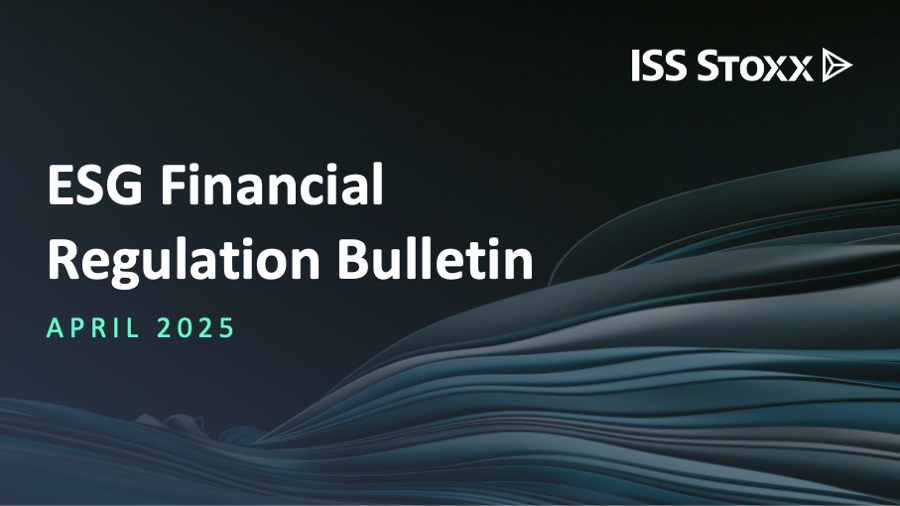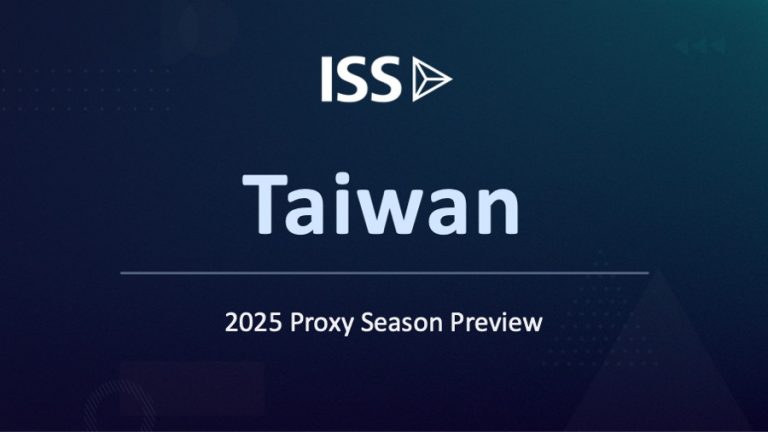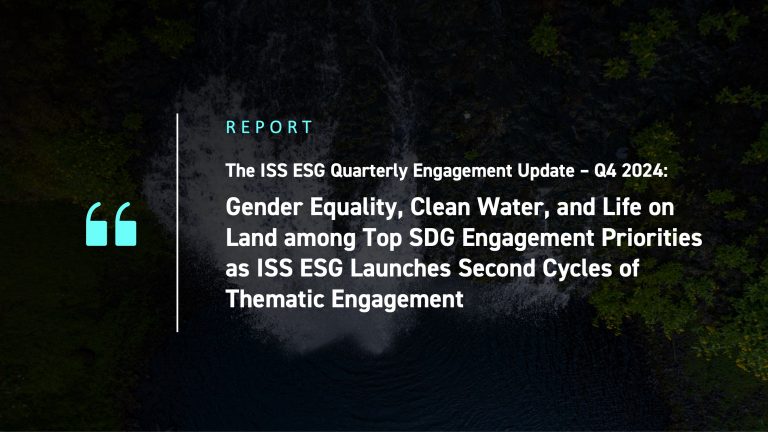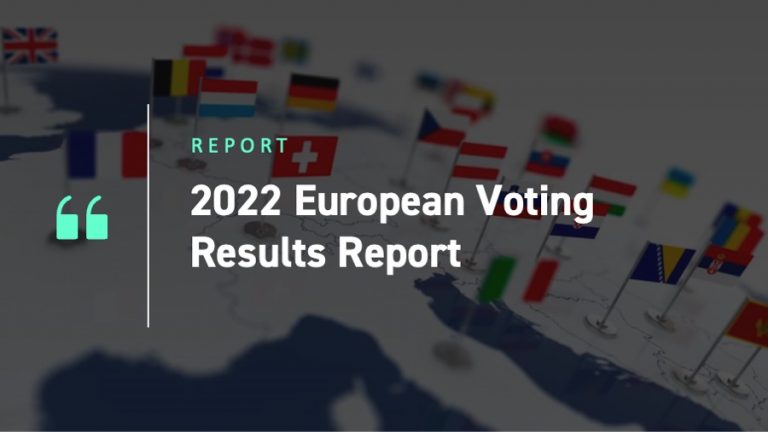
IOSCO
International Organization of Securities Commissions Announces 2025 Work Program
The International Organization of Securities Commissions (IOSCO) unveiled its Work Program for 2025 on March 12. Among its key initiatives and areas of focus for the coming year, IOSCO aims to address ongoing “risks in sustainable finance.” In the Work Program, IOSCO commits to working with the World Bank to develop carbon markets in interested jurisdictions; “expand its analysis of the sustainable bond markets and ESG indices”; and conduct a study on how effective the implementation of IOSCO’s sustainability-related recommendations for asset management has been.
ISSB
International Financial Reporting Standards Foundation Hosts Stakeholder Event on Transition Plan Disclosures
The International Financial Reporting Standards Foundation (IFRS Foundation) hosted a stakeholder event on February 25 to discuss transition plan disclosure requirements in the IFRS S2 Climate-related Disclosures Standard. At the stakeholder event, the 27 attendee organizations expressed support for the IFRS’ efforts to develop a “guidance document to support the application of the [IFRS S2 transition plan] requirements.” The event’s attendees also agreed that there should be a degree of overlap between the IFRS guidance document and materials produced by the Transition Plan Taskforce (TPT); however, the stakeholders expressed a desire for the IFRS documents to omit “some aspects of the TPT material related to normative, policy-oriented or jurisdiction-specific statements.” As a next step, the IFRS Foundation will draft an IFRS Guidance Document, which will likely be published in Q2 2025.
GRI
Global Reporting Initiative Consults on Sector Specific Sustainability Disclosure Standards for the Banking, Capital Markets, and Insurance Industries
The Global Reporting Initiative (GRI) unveiled its sector-specific reporting standards for the banking, capital markets, and insurance industries on March 5. The banking, capital markets, and insurance industry standards were developed by GRI Technical Committees, with experts representing views from corporate entities, investors, labor organizations, and civil society. The new standards aim to promote “internationally consistent sustainability reporting” on the economic, environmental, and societal impacts of financial services organizations. The sector-specific standards provide context for sustainability-disclosures; help reporting entities understand stakeholder expectations; and “outline material topics and list relevant disclosures.” GRI is consulting on the exposure drafts of its three sector-specific standards until May 31.
SBTi
Science Based Targets Initiative Publishes Draft Revisions to its Corporate Net-Zero Standard V2
The Science Based Targets initiative (SBTi) opened a consultation on the “initial draft” of its revised Corporate Net-Zero Standard on March 18. SBTi’s revisions to its Corporate Net-Zero Standard reflect the latest scientific and regulatory developments, international frameworks, and stakeholder feedback. The revisions aim to address ongoing challenges in setting targets for decarbonization and incentivize setting actionable targets that can be validated. The SBTi’s draft revision splits scope 1 and scope 2 greenhouse gas (GHG) emissions target setting; increases flexibility for corporates by enabling target setting on green procurement and revenue generation in place of scope 3; formally recognizes “companies which are investing in Beyond Value Chain Mitigation (BVCM)” and interim carbon removal targets; introduces assessments to track progress against SBTi-aligned targets; and streamlines reporting requirements for small and midsized enterprises (SMEs) and companies from developing markets. SBTi is accepting public comments on its revised Corporate Net-Zero Standard until June 1.

Japan
Financial Services Agency Publishes Draft Revisions to Japan’s Stewardship Code
The Financial Services Agency of Japan (JFSA) opened a public consultation on proposed revisions to its “Principles for Responsible Institutional Investors” (Stewardship Code) on March 21. The JFSA’s revisions reflect the conclusions from the 2024 Expert Panel on the Stewardship Code. The review aims to streamline Japan’s Stewardship Code; ensure that the Stewardship Code remains principles-, and not rules-, based; and promote substantive stewardship in Japan. The JFSA’s proposal includes changes to the Stewardship Code’s principles covering institutional investors’ dialogue with corporate issuers, investors’ collaborative engagement activities, and proxy advisors’ stakeholder dialogue. The JFSA consultation is open until April 20.
ASEAN
Association of Southeast Asian Nations’ Exchanges Meets to Discuss ESG-Related Initiatives
CEOs of representative stock exchanges from the Association of Southeast Asian Nations (ASEAN) met on February 21 to discuss ongoing collaboration on capital markets and sustainability-related initiatives. The ASEAN Exchanges discussed the results of an ongoing request for information about an ASEAN-Interconnected Sustainability Ecosystem (ASEAN-ISE): the ASEAN Exchanges are contemplating developing a centralized sustainability data infrastructure that would align with national regulatory frameworks and have requested input on a proposed “digital marketplace for technology-based sustainability solutions.”
Indonesia
Indonesian Securities Markets Authority Unveils Taxonomy for Indonesian Sustainable Finance Version 2
The Indonesian Financial Services Authority (Otoritas Jasa Keuanga; OJK) published on February 25 Version 2 of the Taxonomy for Indonesian Sustainable Finance (TKBI), which expands the coverage of the TKBI beyond the sectors covered in Version 1. The TKBI classifies economic activities “that support Indonesia’s Sustainable Development Efforts and Goals, covering economic, environmental and social aspects”; the “framework, elements, and criteria” used in TKBI align with both the ASEAN Taxonomy for Sustainable Finance (ATSF) and Indonesian national policies. TKBI Version 1 focused on the energy sector, while Version 2 expands the taxonomies’ scope to cover the construction and real estate sectors; the transportation and storage sectors; and parts of the agriculture, forestry, and other land-use sectors. OJK will now work to develop TKBI Version 3, which will cover the manufacturing and water supply, sewage, and waste management sectors.
Australia
Australian Prudential Regulation Authority Publishes Proposal to Strengthen Governance of Banks, Insurers, and Superannuation Trustees
The Australian Prudential Regulation Authority (APRA) released on March 6 eight proposed changes to its governance framework that aim to strengthen and streamline banks, insurers, and superannuation trustees’ governance requirements. The APRA proposal would require covered entities to identify and document board directors’ skills and capabilities; “address gaps” in their boards’ skills and capabilities “through professional development, succession planning and appointments”; ensure the independence of at least two board members, including the chair; “impose a lifetime default tenure limit of 10 years for non-executive directors”; separate their boards’ risk and audit committees; conduct third-party assessments of their boards’ performance; and strengthen their conflict-of-interest management policies. APRA is accepting feedback on its proposed changes for the next three months and will release “prudential standards and guidance for formal consultation in the first half of 2026.”
Australian Sustainable Finance Institute Unveils Action Plan for 2025-2027
The Australian Sustainable Finance Institute (ASFI) released on March 3 its three-year Action Plan, which outlines ASFI’s progress on goals originating from the 2020 Australian Sustainable Finance Roadmap, as well as upcoming efforts and initiatives to promote sustainable finance in Australia. In its Action Plan, ASFI outlines its sustainable finance policy and regulation priorities, including the adoption of the voluntary Australian sustainable finance taxonomy; the expansion of the taxonomy to “other sustainability objectives”; the “integration of [the] taxonomy in policy and regulation”; an expansion of mandatory climate and sustainability disclosures for corporate issuers; and the development of a sustainable finance product labelling system. ASFI also hopes to integrate sustainability considerations into regulators’ mandates and boards of directors’ official duties and intends to lead capacity-building activities on sustainability considerations in the Australian market.

EU
European Commission Announces Timeline for Upcoming Shareholder Rights Directive Review in Savings and Investments Union Strategy Document
The European Commission (Commission) published a communication regarding its Savings and Investments Union (SIU) Strategy on March 19. The communication outlines the policy measures envisaged by the Commission to foster more vibrant and integrated EU capital markets, increase the participation of retail investors, and boost investment in EU companies, all with a view to promoting the EU’s economic competitiveness. As part of the communication, the Commission announced that it “will assess the need for, and consider a potential review of the Shareholders Rights Directive by Q4 2026 to make it easier for investors, intermediaries and issuers to operate across Member States.”
European Banking Authority Publishes Report on Availability and Accessibility of Data to Assess ESG Risk
The European Banking Authority (EBA) published a report on February 24 on the current market environment of data related to ESG-related credit exposure risks and the potential feasibility “of introducing a standardized methodology for identifying and qualifying credit exposures to such risks.” The EBA study found that the availability and accessibility of ESG data, the consideration of ESG risk by credit institutions, and the standardization of ESG data methodologies is generally improving; however, the report also revealed a large degree of methodological divergence in different types of ESG data and scores, as well as ongoing challenges related to data availability, quality, and granularity. The EBA study examined the feasibility of introducing a standardized methodology to identify and qualify ESG credit risks and found that the prospect of standardization would differ based on the type of exposure and risks assessed by each ESG score and External Credit Assessment Institutions’ (ECAI) credit risk rating. Therefore, “should regulatory efforts towards standardization be pursued, a sequenced approach would most likely be necessary.”
UK
Financial Reporting Council Publishes Three Year Plan to Back UK Growth
The U.K. Financial Reporting Council (FRC) published its “3-Year Strategy: 2025-28″ on March 20, which outlines the FRC’s key objectives and regulatory priorities for the coming years. The FRC’s first objective in its three-year strategy is to “enhance corporate governance, corporate reporting and investor stewardship in a manner that supports UK economic growth and investment.” The FRC will develop sustainability reporting standards for U.K. companies, as well as associated markets for assurance of sustainability-related disclosures, as part of its three-year plan. The FRC will also continue to maintain the U.K. Stewardship Code and Corporate Governance Code in alignment with its strategic objective to promote growth in the U.K. economy.

US
US Securities and Exchange Commission Extends by Six Months Compliance Dates for Amendments to Investment Company Names Rule
The U.S. Securities and Exchange Commission (SEC) announced on March 14 that it will provide a six-month extension in the compliance dates for the 2023 amendments to the Investment Company Act “Names Rule.” The amendments to the “Names Rule,” adopted by the SEC in September 2023, required funds “with names suggesting a focus in investments with particular characteristics, for example, terms such as ‘growth’ or ‘value,’ or certain terms that reference a thematic investment focus, such as the incorporation of one or more Environmental, Social, or Governance factors” to invest at least 80 percent of the value of their assets in investments aligning with said focus. Funds captured in the amended scope of the “Names Rule” would also have to periodically assess their compliance with the rule and adopt policies to quickly come back into compliance if their fund “departs from its 80 percent investment policy.” Under the SEC’s extended compliance timeline, larger fund groups will now have to come into compliance with the amended “Names Rule” by June 11, 2026, while smaller fund groups will now have until December 11, 2026, to come into compliance.
By:
Noam Cherki, Associate, Regulatory Affairs & Public Policy, ISS STOXX
Hugo Gallagher, Senior Associate, Regulatory Affairs & Public Policy, ISS STOXX
Karina Karakulova, Director of Regulatory Affairs & Public Policy, ISS STOXX




